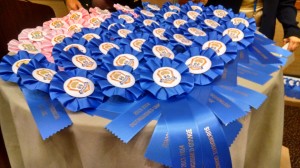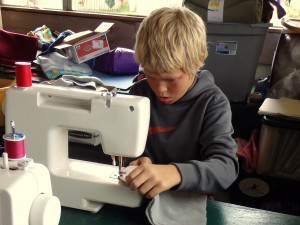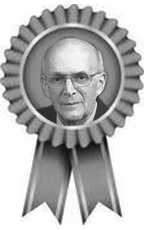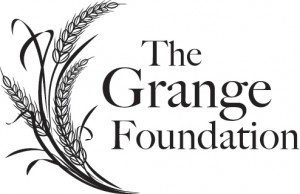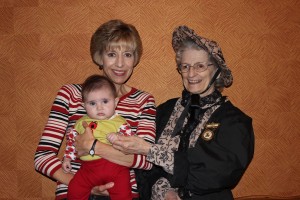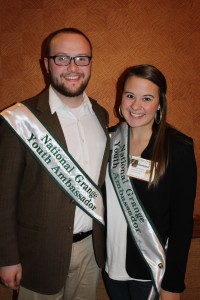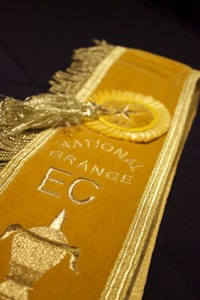Day 4: National Grange 148th Annual Convention
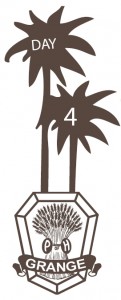 |
 |
Reception Honors Distinguished Granges |
| BY DEBBIE GEGARE DCI Communications Fellow| de*******@***oo.com
The program honors Subordinate and State Granges that fulfill responsibilities while excelling in the areas of membership, fundraising and community service in their communities. Two State Granges, Maryland and New York, and seven Subordinate Granges received plaques for their five continous years of being a Distinguished Grange. “When the previous National Communications Director, Jen and I, along with the previous National Membership Director Rusty Hunt formulated this program six years ago, we didn’t know how popular it would become,” said National Grange Sales, Benefits, Programs and Membership Recognition Director Samantha Johnson. “Our Granges are proud to be honored for their commitment to their communities and our organization.” In total, 11 State Granges and 51 Subordinate Granges received the honor this year. Johnson said this was the highest number of winners of any year. The five year plaques were donated by former National Youth Director Wib Justi’s family, and his wife June and daughter Mary Justi Sheppard were in the audience. “Wib was a fantastic supporter of the Grange, and he would be proud that these active Granges were recognized for their work,” National Master Ed Lutrell said. |
Washington Youth co-host statewide service project |
| BY SUZY RAMM DCI Communications Fellow | gb*******@******ge.org
In the case of the Northeast Region, they should be proud. When eight youth attending the 2013 National Grange Convention in New Hampshire saw the Mitten Tree display, they were inspired. The tree included scarves, hats and mittens collected for those in need. The Washington State Grange Youth delegation decided it was a project that they could introduce in their state. The State Youth Committee, in cooperation with the State Grange Community Service Department, began collecting stocking caps, mittens, gloves, scarves, and socks – purchased or homemade – for distribution to the less fortunate in the host district for state convention. “A lot of the senior ladies of the Grange put their sewing and knitting skills to work in support of the project,” said National Youth Ambassador Aaron Gwin, of Washington. The project was promoted in the State Youth Director’s column in the State Grange Paper, and the state Lecturer, under who’s jurisdiction community service falls, promoted it at his conferences held around the state. During the summer, campers at the Camp Morehead Junior Grange Camp made fleece stocking caps; one for them to take home and one for donation to the project. At the Western Regional Conference, held in Montana in August, the Washington State Grange Youth invited the other states in the Western Region to join them in the project. After display of the donations at the 125th Annual Convention of the Washington State Grange, the donations were then divided equally among the 11 counties that made up the host district so they could be distributed to those in need. “There were 2,672 items brought to state session and it was great to see all counties in the state participate in the project,” Washington State Grange Youth Ambassador Leah Bardal said. Bardal said plans are in place to repeat the drive in 2015 and will be titled “Keeping the West Warm.” |
Taking legislative advocacy home with you
|
| BY CHRISTOPHER R. SZKUTAK DCI Policy & Communications Fellow | cr******@***il.com Have you enjoyed the policy work of the delegate body this week and would you like your Grange to be more active in your local community and state? One of the best ways to do this is through advocating for policy with your local government. While the Grange is a non-partisan organization, that does not mean we cannot have our voices heard on policies that affect our communities. But how exactly can your Grange go about doing this? Here are my four tips to get your Grange more involved legislatively. 1) Appoint a legislative chair for your subordinate/community Grange and/or Pomona. Having a point person that your Master can go to for all things legislative and ask to report at meetings not only encourages your members to think about legislative issues but also keeps your members informed. This enables your Grange to act if there is an issue you think the Grange could have an effect on. 2) Plan a Legislative Night. With the aid of your Lecturer, plan a Legislative Night where you invite local officials including City Council Members, Selectman, Town Managers, Alderman, Mayors, State Representatives, State Senators, or any other local official to your meeting. This is an opportunity for them to learn more about your Grange but also the chance for you to speak to them in a more intimate setting. In an election year, plan a candidate forum for a local office, just ensure that you invite all the candidates, despite their partisan affiliation, to your meeting. Ask them questions that your members submit. 3) Take a look at the National/State Grange Policy Book. Talk about the policies of the National/State Grange at a Grange meeting. Are there policies that your Grange feels are missing? Are there other policies the National/State Grange should take action on? If this is the case, encourage your Grange to write a resolution for State Session and let the delegates debate on it. 4) Keep track of legislative news for upcoming bills that the Grange might want to take a position on. Is there an upcoming bill or ordinance coming before your local legislative body that conflicts with National/State Grange policy or that your Grange has opinion on? Contact the appropriate representative or board and let your voice be heard. The non-partisan nature of our organization allows us to transcend party and speak up for what we see as best for our local communities. As citizens you have the right to speak up, so use this right. |
Volunteers in the new millennium
|
| BY KARIE BLASINGAME DCI Communications Fellow | Kb***********@***il.com In today’s fast paced world, there is an idea that it is harder than ever to get people to volunteer, especially the millennials, born in the ‘80s and ‘90s. The truth, however, may be that we are not looking in the right place. There are literally hundreds of websites focused on pairing those willing to volunteer with a volunteer activity. Some of these sites like DoSomething.org specifically targets youth age 13-15 in a two-fold beneficial relationship. The volunteer chooses a campaign from their website. They get their friends and others to help them out with the campaign. They provide photographic evidence of the volunteer activity. Once they prove they have completed a campaign they are entered to win a scholarship. DoSomething.org has engaged over 3.1 million volunteers. These young millennial volunteers receive something in return for their hard work. Expectations are that this method will motivate young people to continue volunteering after they have left school. VolunteerMatch.com is a site that encourages non-profit organizations to post volunteer opportunities. This allows a volunteer to look for something that matches their skill set. One of the many volunteer stories on VolunteerMatch.org describes, Jenna Whittingham who was searching for a way to give back when she found the right fit for her. The project utilized her skills in graphic design for a cause close to her heart. Whittingham was able to create a design for her local American Cancer Society chapter that could be used across the nation in different formats that allowed the ACS to impact more people with her work. Granges can learn from other organizations who have already taken to the net to find people willing to assist in making their communities better. To engage these younger people, Membership/Leadership Director Michael Martin said we need to adjust to change and be ready to fulfill the desires of prospective members. |
T-Shirt sales help support Youth |
| BY DEBBIE GEGARE DCI Communications Fellow | de*******@***oo.com
What about a way to honor Wib Justi, our past National Grange Youth Director? Maybe you just need to add to your wardrobe. Then this t-shirt is for you. Potomac Grange #1, has created a t-shirt with Justi’s famous response: “I’d be delighted.” “Wib, and his wife June, were members of Potomac Grange for years,” Potomac Grange Overseer Leroy Watson said Wednesday. “He is an incredible figure in the Grange and we are proud to be able to honor his legacy with a product that might allow those people wearing it to talk about him, the Grange and the spirit of service that is inherent in the response ‘I’d be delighted.’” The shirt went on sale Wednesday and the sale ends December 1. Shirts will arrive on or about Dec. 15, in time to be a great Christmas gifts for any supporter of the Grange Youth program. The shirt is sold only through booster.com for $20 each with a $5 shipping charge for the whole order no matter the number of shirts. The profit per shirt is based on the number of shirts sold, increasing in specific sales increments. Potomac Grange will match the amount raised from shirt sales and send all funds to the National Grange Foundation – Youth Fund. June and their daughter, Mary Justin Sheppard arrived at session Wednesday. “When I saw that, I was totally amazed.” June said of the shirt and fundrasier. “He would be delighted.” Individuals may also choose to make donations in addition to purchasing shirts. The first shirt was purchased by Harry Massey, a former National Grange Membership Director and Potomac Grange member. He also contributed $25 to the youth fund through the site at the same time. Potomac Grange Lecturer and National Grange Sales, Benefits, Programs and Membership Recognition Director The table is located across from the registration area and staffed by 2012 PhRMA Communication Fellow Barbara Foster. |
Trademark Protection donations announced |
| BY CHRISTOPHER R. SZKUTAK DCI Policy & Communications Fellow | cr******@***il.com
National Grange Assistant Steward John Plank, the Master of the Indiana State Grange, announced that during their state session, Indiana Grangers donated $1,011 for trademark protection. His wife, Susan, and he would be adding another $500 for a total donation to the fund of $1,511. “In the Grange we are a family, we would help another state if they were in need. The same is true for the National Grange,” Plank said. Trademark Protection Manager Leroy Watson saw the commitment of a small Grange state as a true testament “The Indiana State Grange’s generous donations to our National Grange Trademark Protection program is a vote of confidence in our efforts,” Watson said. “Trademark protection undoubtedly promotes growth and development for the Grange.” Following the donation, Steven Coye, Master of the New York State Grange and Chairman of the Board of the Grange Foundation, presented a check from a member of Stony Point Grange #1694 of Pennsylvania that also was meant to benefit trademark protection. Coye also took the opportunity to encourage everyone to donate to the Grange Foundation and remind those assembled that donations to the foundation are tax-deductible.
|
Caroline Hall visits National Grange Session |
| BY CHRISTOPHER R. SZKUTAK DCI Policy & Communications Fellow | cr******@***il.com
The meeting was graced by the presence of Caroline Hall, considered the eighth founder of the Grange. Hall, played by Dorothy Eckert, of Ohio, relayed her experiences growing up and more about her uncle, Oliver Hudson Kelley. Hall was most enthusiastic when discussing her role in the founding of the Grange. She recounted a conversation she had with Kelley about women in the Grange. “You have to include the women. If your organization is going to last, you need to include the women,” Hall said. During the time of the founding of the Grange, she served as Kelley’s personal secretary. She helped keep the records of Kelley’s travels and filed requests for dispensation of Grange deputies. Hall was living with the Kelley’s during the time of the founding of the Grange and helped her aunt, Temperance, She also lived with the Kelley’s during their many moves around the country. In fact, Oliver Kelley named the town he settled in Florida, Carrabelle, after Caroline. She concluded the historical presentation with a discussion about her last experience at National Grange in 1908 with Kelley and the end of her life. To further honor her, she was escorted out of the hall to the tune of “Be Faithful, O Patron”, a song in which she wrote for the Grange songbook. |
Talent, ideas abound at fair |
| BY KARIE BLASINGAME DCI Communications Fellow | Kb***********@***il.com From across the country, Grangers have brought a showcase of award-winning projects and displays now available to see in the Idea Fair and Best of Show at the 148th Annual National Grange Convention. “This is a fantastic way to show off all the talent within our organization and learn about how to enhance your Grange experience,” National Grange Lecturer Jim Tetreault said of the event. In the Best of Show display are projects from each state Grange. “Grangers across the country have outdone themselves with how much talent we have,” Tetreault said. Some prizes have already been awarded. Grangers excited about Community Service will need to check out the Community Service books on display. “We have Grangers making their communities better all across the country and each year we see how much they mean to their communities and do for others when we review these books,” National Grange Sales, Benefits, Programs and Membership Recognition Director Samantha Johnson said. “Picking a winner is nearly impossible.” Winners will be announced at the Celebration Banquet on Saturday night. The Idea Fair going on around the outside of the room includes booths from companies and programs that partner with the National Grange. These partners include The Kelley Farm, Dogs for the Deaf, Camp Berger, and National Junior Horticulture Association (NJHA). Grange displays includes the 2015 Host Committee, GROW Club silent auction, Jr. Grange silent auction, Youth, Juniors, Membership, member benefits, and more. One display Grangers won’t want to miss is that of the Dictionary Project. Allie Osuch, the director of the outreach program for the nonprofit is working together with National Grange to cover schools across the country with dictionaries, according to Johnson. There are many Granges who already assist in this effort. |
Get to know the Youth Ambassadors |
| BY LINDSAY SCHROEDER DCI Communications Fellow | lr*********@*im.com
Aaron Gwin, Washington But as a Youth Ambassador, in mid-October I flew to Pennsylvania for their State Session. I am forever grateful to Rob and Jennifer Beamon, just named Pennsylvania State Grange Young Married Couple, who fundraised for a full year to fly me in. The trip to Pennsylvania will be something that I will cherish forever. As National Youth Ambassador I also traveled to Missoula, Mont., to the Western Regional, where I assisted National Grange Youth Development Director Charlene Espenshade in anything she needed help with. Over the last year, I have realized that wherever I travel, Grangers will always be Grangers. We are one odd, ugly family, but we are a family. I would like to thank everyone from my state for their support, and if anyone sees me around and feels the urge to talk, grab my arm and let’s converse! Montana Wrigley, North Carolina I am so lucky to have learned so much through out this year. Between the many emails, Facebook messages, phone calls, and Skype meetings, it has been such an honor helping The Grange will always be my family and I am forever grateful for all of the amazing memories it has given me so far. |
Exec Committee has host of duties |
| BY LINDSAY SCHROEDER DCI Communications Fellow | lr*********@*im.com
Currently, the spots are filled by Betsy Huber (Executive Committee Chair) of Pennsylvania, and Duane Scott of Wisconsin. Huber was elected initially in 2006 while Scott was elected in 2008. According to the Bylaws, the Executive Committee has many duties to fulfill, by representing the National Grange. This group of four members as well as the National Grange President and Overseer by virtue of office who serve the same function as board of directions just as any other nonprofit corporation does. The general responsibilities of members is to implement policy adopted by the delegation body and interpretation thereof. They are also responsible for the financial status of Granges, invested funds, and human resources at the National Grange, including what positions we hire and the pay scale for the positions, while the National Master is responsible for filling those positions. The Executive Committee prepares the draft budget sheet that is submitted to the Audit and Budget committee at convention each year and between sessions they act in the place of the delegates. Some of the ways they help the Order when not in National Session is by reviewing current events to assure that the financial position and reputation of Grange is not at risk, serving as the eyes and ears of the delegates. They are also on the lookout for concerns or issues in our State and local Granges. |
Quilt block contest a hit with members |
| BY KARIE BLASINGAME DCI Communications Fellow | Kb***********@***il.com Two years ago the National Grange Lecturer’s Department brought back a beloved contest – the quilt block. The quilts will be part of a Charity Quilt Auction at the 150th Anniversary of the National Grange. This year, there were more than 70 entries, double from last year according to National Grange Lecturer Jim Tetreault. “We have enough blocks for two quilts,” Tetreault said. There were 12 finalists in this year’s quilt block contest, and all quilt blocks are on display in the Idea Fair & Best of Show. “We were happy to see people liked the additional categories for the contest and the runners and other things they made were really amazing,” Tetreault said. He said in the new “quilted products” category there were two different ties and several really excellent items. |
Grande Advocacy yesterday and tomorrow |
| BY KARIE BLASINGAME DCI Communications Fellow | Kb***********@***il.com Since our founders began our organization we have been an integral part of grassroots legislation. In January 2013, the National Grange elected to create Grange Advocacy, a new 501(c)(4) entity called Grange Advocacy. The firm determined that “the geographic presence of the National Grange membership will be of significant interest to prospective partners.” Grange Advocacy is made up of six board members and overseen by the Legislative Director, J. Burton Eller Jr. of the National Grange. Three members of the committee have to be affiliated with the Grange and 3 are outside people who have an interest in issues advocacy, especially related to rural America and agriculture. The company officially meets annually and while they are moving forward and growing they have teleconference meetings more often. “Grange Advocacy is a way to create a mutually beneficial relationship with other companies or organizations that have the same policies as our organization and work together to get our message out,” Grange Advocacy President Phil Prelli said Tuesday. Prelli is also a member of the National Grange Executive Committee. “Grange Advocacy will expand our Washington advocacy by creating relationships that will strengthen the efforts of the National Grange,” Eller said. Eller said the organization gives us non-traditional ways to raise money to work on items that are important to our organization such as getting broadband into rural areas. |
Agriculture in 2014: Public Understanding of Agriculture |
| BY CHRISTOPHER R. SZKUTAK DCI Policy & Communications Fellow | cr******@***il.com
As our society becomes less and less agrarian, the connections between the average person and the life of farmers have weakened. But why should we care about public opinion? Simple. Public opinion drives business. Public opinion drives legislation. If agricultural advocates and farmers do not make strides to educate the public about their profession, then people will believe the misinformation that is presented about agriculture. The case study below highlights the consequences of what can happen when people do not fully understand agriculture and how farmers and Grangers can work together to make sure the truth is heard. Case Study: Massachusetts Animal Welfare 2013 Both would have banned certain confinement practices, specifically veal crates, gestation crates and battery cages. Lack of proper understanding about agriculture allowed the bills to be crafted, and each was based on untruths. First, there are no veal crates or gestation crates used in Massachusetts. They have not been used for more than a decade and will not likely be used again. These practices are geared towards large, economy-of-scale operations that are not found within the state. Second, there is only one battery cage egg operation in Massachusetts. This farm has only 3,000 birds and sells their eggs directly to the consumer and to area markets. This farm was part of the buy local movement within the state, not a factory farm. When the Massachusetts State Grange learned about these bills, they worked with a coalition of organizations, including Massachusetts Farm Bureau, Mass Veterinary Medical Association, Mass Chapter of the Northeast Organic Association and the Cummings School of Veterinary medicine to support an alternative bill that would help animals, consumers and farmers and create a board at the Massachusetts Department of Agricultural Resources. The board could create regulations for issues impacting humane treatment of livestock, including practices that actually exist in Massachusetts. The State Grange worked with its members to contact their representatives and send letters about the issue. Farmers and supporters worked together to try to persuade legislators that there were better options. Farmers are not in favor of animal cruelty, but needless laws that will have almost no effect on farmers only present farmers negatively. If people think that farmers are using practices that harm animals, then they are more likely to believe other falsehoods about agriculture. Fortunately, through the advocacy of Grange members, and other coalition partners, the law was not passed. This case study makes clear an important truth: without strong agricultural advocacy, laws that hinder agriculture will continue to be passed. It is the responsibility of people who understand or are involved with agriculture to help to educate others. As people passionate about agriculture, we need to use our Granges to educate the public with the truth about agriculture. Over the next two days we will take another look at agricultural education and how the Grange can be a force to enlighten our neighbors and make sure agriculture is part of the curriculum in our schools. |

